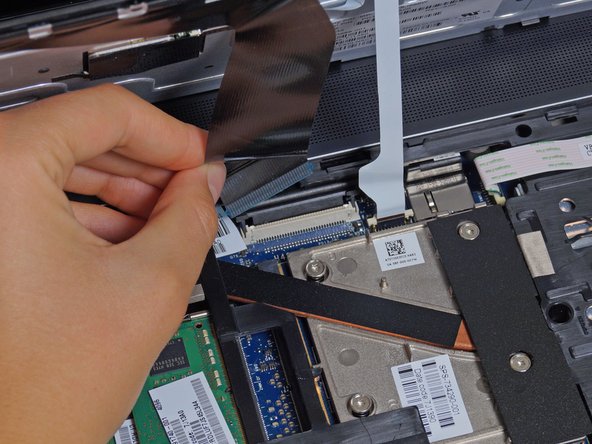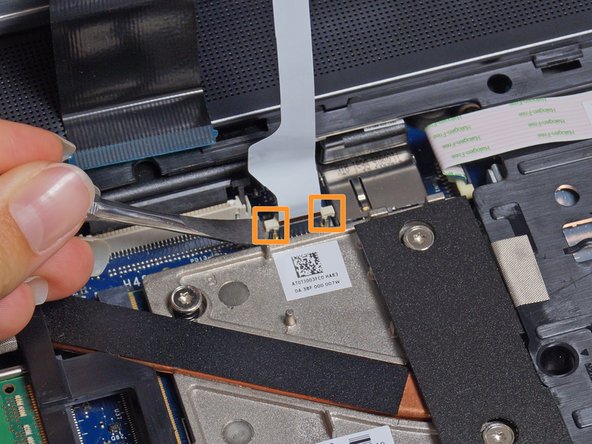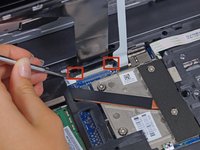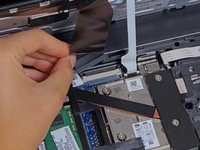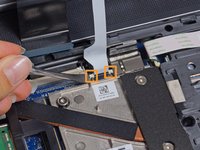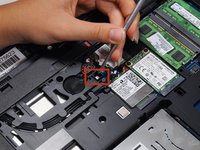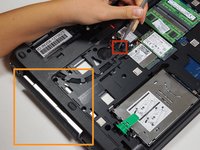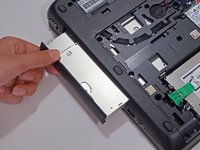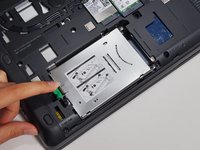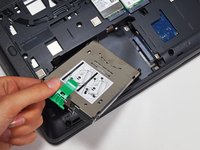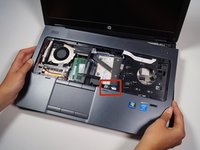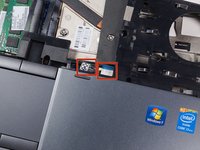
HP ZBook 15 Fan and Heatsink Replacement
Introduzione
Vai al passo 1Does your computer feel warmer than usual? Here are some reasons why your laptop might be running hot. If you determine that you need to replace the fan or heatsink assembly, follow this guide!
-
-
Flip the laptop over.
-
Slide the lever with the battery symbol beside it firmly until the battery pops out.
-
Remove the battery from the laptop.
-
-
-
Slide the right lever firmly to the right.
-
Slide the cover towards yourself to remove it.
-
-
-
Remove the two 16mm screws with a Phillips #0 screwdriver.
Note that it is not necessary to completely remove these screws. They are meant to be 'captive' and not removed completely. If you unscrew them to that 'first thread' so they are loose and floppy, they are no longer holding the keyboard in place and it is safe to continue to the next step.
-
-
-
Flip the laptop over so the keyboard is visible.
-
Insert the spudger under the left side of the keyboard.
-
Carefully raise the side of the keyboard and firmly pull the left corner of the keyboard until it pops up.
-
Run your fingers under the edges of the keyboard along the top edge of the keyboard, from the top left to the top right, to separate it from the remaining clips.
-
Carefully slide the keyboard up toward the screen and out of the case.
Please keep in mind that the keyboard comes with a metal plate. If you managed to pry one of the plastic rivets out of the keyboard, you've damaged the keyboard...
(I should have read the comments about taking the optical drive out first, haha...)
-
-
-
Unscrew the captive screw shown near the battery compartment with a Phillips #0 screwdriver.
Missed 3 screws to be removed before pushing the optical drive!
Actually there are 4 screws
-
-
-
-
Unscrew the three captive screws holding the drive in place with a Phillips #0 screwdriver.
-
-
-
Unscrew two 3mm screws from the hard drive bay with a Phillips #0 screwdriver.
-
-
-
Gently lift the fan and heatsink assembly straight up and out so you do not smear the thermal paste.
I’m planning to upgrade the GPU on my Zbook. Do you have any idea what thermal pads should I use?
As far as I know, there are different components that require pads of different thickness (memory modules, VRMs, etc). I dont remember reading about this in HP’s official service guide for this model, perhaps because they sell the GPU and heatsink with those pre-applied.
Also, I would like to be recommended a thermal pad brand if possible.
Thanks in advance!
Is it always necessary to replace the heatsink, or can I just replace the fan and reseat the heatsink with a good thermal pad? I am seeing the fan sold separately and not sure why the heatsink itself might need replacement—didn’t thin k they “wore out”.
-
To reassemble your device, follow these instructions in reverse order.
To reassemble your device, follow these instructions in reverse order.
Annulla: non ho completato questa guida.
Altre 14 persone hanno completato questa guida.
6Commenti sulla guida
Wow, looks like that graphics card is actually user replaceable? That’s really awesome to see, with both the CPU being socketed and GPU being on a slot, that makes this system super upgradable and (hopefully) long lasting. If you manage to burn your GPU out, you don’t have to replace the entire motherboard.
I performed this procedure to replace the fan/heatsink assembly, and used the HP maintenance and service guide for this machine which can be found at http://h10032.www1.hp.com/ctg/Manual/c03... - it differs from these instructions (an improvement) is two ways - first, the optical drive should be removed before the keyboard, and then the keyboard can be pushed up from below to get it started, which is much better than forcing the whole thing from above. Secondly, removal of the top cover does not start with separating the front edge as these instructions show, but by lifting the back edge and then sliding the cover forward, which takes very little force. The Ifixit instructions were a good start, but I was glad I had the real stuff from HP.
What about electrostatic discharge though? How does it fit into the picture, and how does one protect against it?
I did this in order to clean up the innards and apply thermal paste. I gotta say it’s a hastle compared to the older EliteBooks where all you had to do to access the CPU was to open the service door/cover.
But eh, what can you do, right?
Great write up. However, these copper pipe type coolers don’t fail unless you’ve busted the fan somehow. For those of you with this overheating problem, just take it apart and put new thermal paste in there.
My 6yr old machine was overheating badly, and would BSOD on occasion. A quick look with hwinfo revealed a cpu that was hitting 100°C.
Too hot!
I blew in the vents with some light compressed air and this blew out a small slug of lint.
Didn’t help much.
Ran Aida64 FPU and it would immediately overheat and throttle
I went by the pics on here and knew that my fan was operating normally so I figured I’d try new paste before dropping $50+ on a new fan.
Pulled the heatsinks out, put some new Artic Silver on there and put it back together.
Now even under Aida64 FPU it’s only hitting 93°C now and no throttling.
This is the best set of instructions I have had the pleasure to work with. Laptop had an overheating issue. The fan worked fine so this led to the only other issue, the thermal grease was no longer working efficiently. I disassembled the lap top per your great and accurate instructions cleaned off the old thermal grease and replaced it. Reassembled Laptop by reversing your instructions and all works fine. No more overheating issues.



















